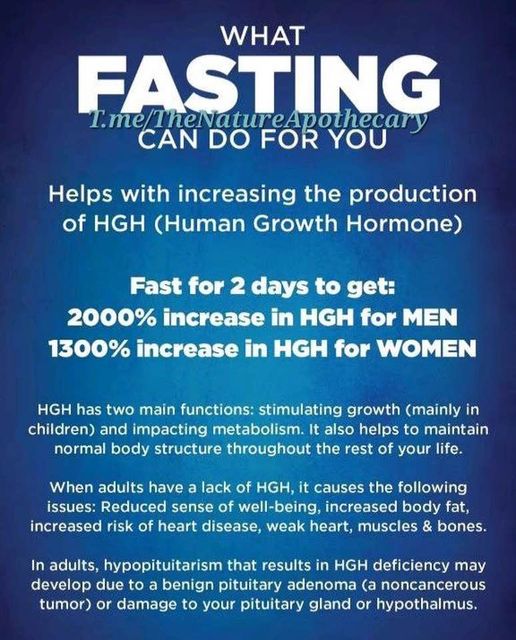
The Potential Benefits of Fasting: Boosting Human Growth Hormone
Fasting has gained significant attention in recent years for its potential health benefits. One intriguing aspect of fasting is its reported ability to increase the production of Human Growth Hormone (HGH). Let’s explore what the research suggests about fasting and HGH, and what this could mean for your health.
Understanding Human Growth Hormone
HGH is a vital hormone produced by the pituitary gland. It serves two main functions in the body:
- Stimulating growth, particularly in children
- Impacting metabolism throughout life
Additionally, HGH plays a crucial role in maintaining normal body structure as we age. This hormone is essential for overall health and well-being.
The Fasting-HGH Connection
According to the infographic, short-term fasting may lead to a significant increase in HGH levels:
- For men: A 2000% increase in HGH after fasting for 2 days
- For women: A 1300% increase in HGH after fasting for 2 days
These numbers are striking and suggest that fasting could be a powerful way to naturally boost HGH production.
Potential Consequences of Low HGH
When adults have insufficient levels of HGH, it may lead to several health issues:
- Reduced sense of well-being
- Increased body fat
- Higher risk of heart disease
- Weakened heart function
- Decreased muscle strength
- Weakened bones
It’s important to note that low HGH in adults can sometimes be attributed to a condition called hypopituitarism. This may develop due to a benign pituitary adenoma (a non-cancerous tumor) or damage to the pituitary gland or hypothalamus.
Considerations and Cautions
While the potential benefits of fasting for HGH production are intriguing, it’s crucial to approach this information with some caveats:
- Individual results may vary: The dramatic increases in HGH cited may not be universal for all individuals.
- Short-term vs. long-term effects: The infographic mentions a 2-day fast, but more research is needed on the long-term effects of regular fasting on HGH levels.
- Other health factors: Fasting can affect various aspects of health beyond HGH production. It’s important to consider your overall health status and any existing medical conditions.
- Consult a healthcare professional: Before starting any fasting regimen, especially for hormone-related purposes, it’s essential to consult with a qualified healthcare provider.
- Not a replacement for medical treatment: If you have diagnosed HGH deficiency or other hormonal imbalances, fasting should not be considered a substitute for proper medical treatment.
Conclusion
The relationship between fasting and HGH production is a fascinating area of study. While short-term fasting may indeed boost HGH levels significantly, it’s important to approach this information with a balanced perspective. Fasting can be a powerful tool for health when done safely and appropriately, but it’s not a one-size-fits-all solution.
If you’re interested in exploring fasting for its potential HGH-boosting effects, start by educating yourself further on different fasting methods and their impacts. Always prioritize your overall health and well-being, and work with healthcare professionals to determine the best approach for your individual needs.
Remember, hormonal health is complex, and while fasting may offer benefits, it’s just one piece of the larger puzzle of maintaining a healthy, balanced lifestyle.
